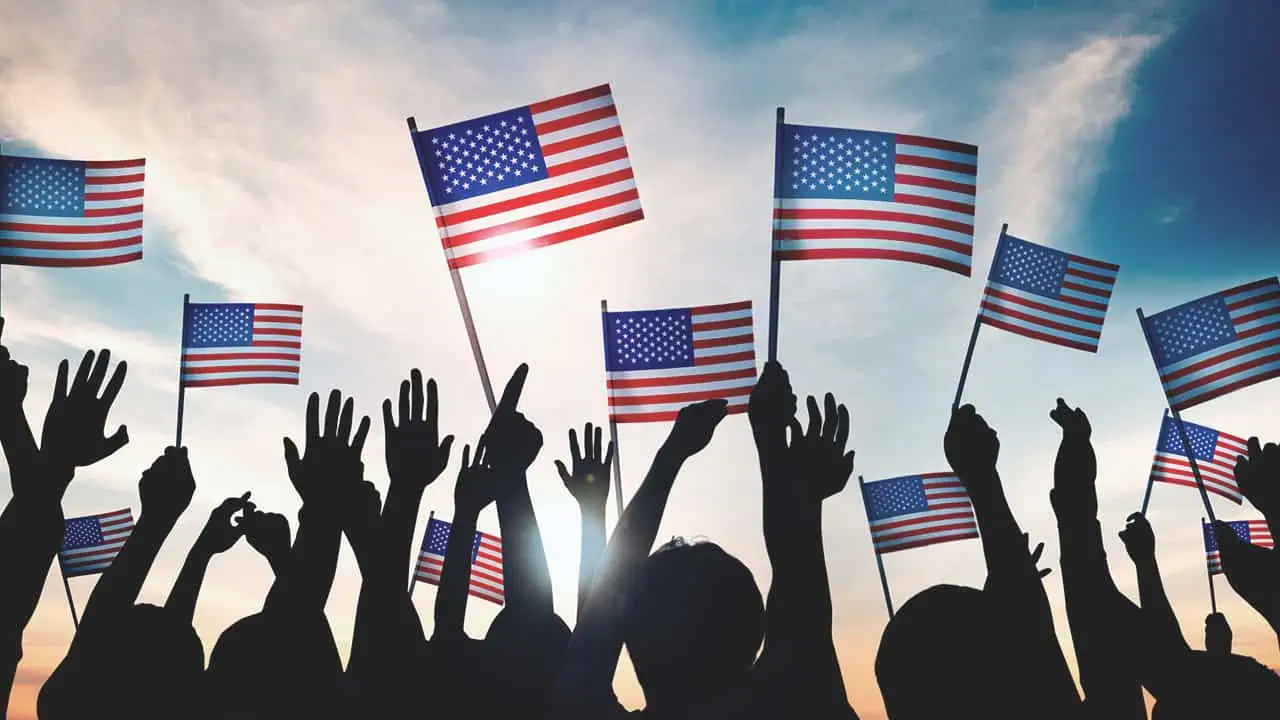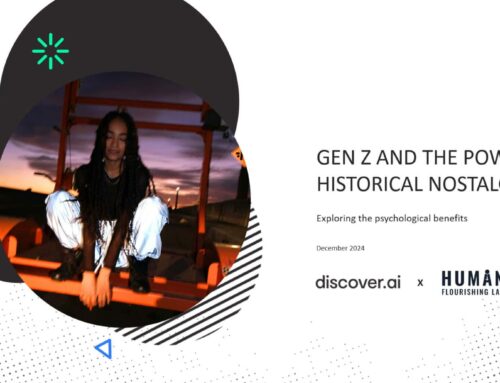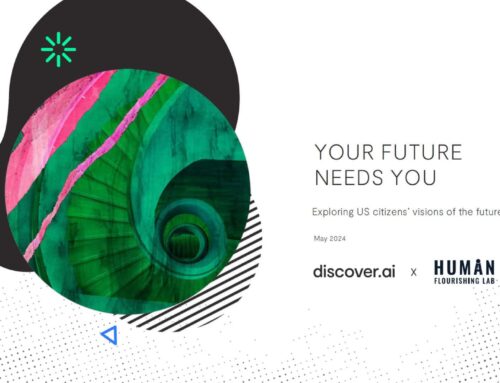
INTRODUCTION
It is easy to tell a story of The United States as a deeply divided nation. Americans are a diverse group withmajor policy preference differences that can make it difÏcult to unite under a common vision of our country. Not to mention, we live in era in which outrage-driven cable news and clickbait social media provoke distrust and hostility towards those who have different social and political beliefs. But there is another story that deserves more attention. Despite the real differences that exist and the media outlets and platforms that often amplify and exaggerate them, most Americans are unif ied in their love of country.
THE CURRENT STATE OF AMERICAN PRIDE
In a new survey conducted during the month of October by the Archbridge Institute and the Challey Institute for Global Innovation and Growth, we asked a nationally representative sample of more than 500 US citizens whether or not they are proud to be American.
Based on the many negative stories in the media and messages from social commentators arguing that the US is in decline, uniquely mishandling the COVID-19 pandemic, losing its status as a world leader, no longer a land of opportunity, and hopelessly divided by political partisanship, it would be understandable to assume that a high percentage of Americans are not proud of their national identity right now. But such an assumption would be incorrect.
We found that the vast majority of US adults (87%) are proud to be Americans. There are differences across political parties, but the real story is one of similarities. Out of the 181 Republican participants, only two indicated not being proud to be American. Even though there was more of a divide among the 230 Democrat participants, most (82%) reported being proud to be American. Among the remaining 97 individuals who identified as politically unafÏliated, again, most (78%) indicated being proud to be American.
As another way to examine ideological differences, we also asked participants to rate how conservative or liberal they are on a 9-point scale (1 = very conservative, 9 = very liberal). We classified those who scored 1 to 3 as being conservative (about 27% of our sample), 4 to 6 as moderate (about 45% of our sample), and 7 to 9 as liberal (28% of our sample). Again, across all groups, the majority of individuals reported being proud to be American (99% of conservatives, 88% of moderates, and 75% of liberals).
Regardless of political party and ideology, most Americans are proud to be American.
Slicing the data in other ways such as by gender, race, and religion paints a similar picture of national pride. Eighty-five percent of women and 90% of men reported being proud to be American, as did over 80% of individuals in every racial/ethnic category (81% of African Americans, 88% of Asian Americans, 84% of Latinos, and 90% of whites). For distinct religious groups, again, the take-home message is one of national unity. Ninety-one percent of Christians, 94% of Muslims, 95% of Jews, 73% of atheists, and 84% of people who indicated some other religion reported being proud to be American.
We also considered potential differences based on level of education, income, and employment status. Regardless of how much formal schooling one has received, most Americans are proud of their national identity. At every level of education, over 80% of Americans reported being proud to be American from 85% for those with a high school diploma or equivalent to 95% of those with a doctorate degree.
What about income? Is national pride a luxury for those who make a lot of money? No. From 82% of those who make less than $20,000 a year to 92% of those who make over $100,000 a year, again, most Americans reported being proud to be American. Regarding employment status, 90% of those working full-time and 89% of those working part-time indicated being proud to be American. Even among the people currently facing the frustration of being unemployed but looking for work, 84% reported being proud to be American.
WHY ARE AMERICANS PROUD OR NOT PROUD?
We also asked participants to explain why they are or are not proud to be American. Among proud Americans, many gave succinct and intuitive answers such as “love everything about it,” “because it is a privilege,” and “I just am” but freedom was a common theme. For instance, while one individual simply wrote “freedom” others provided more detail such as “I have traveled extensively and know that America is the best country to live in. We have more rights than a lot of other countries and the ability to do whatever we want in life” and “This country let’s a person to be free. You can achieve the American dream.”
A number of proud Americans acknowledged dissatisfaction and serious problems they believe need attention, but expressed a broader and more positive and progress-focused outlook. For instance, one person wrote, “I am proud to be an American because even though our country is far from perfect, I believe the majority of people are good, and want good things for our country and we can move forward and be an even better country.” Another offered, “It is true, during recent times, things here in the US have been strained with political and social upheaval. However, life in the US is the gold standard for the world! Living here is the ideal because we are always striving to be the best at everything! I’m proud of that.”
Some proud Americans appeared to base their current attitude explicitly on the belief that Americans can unite to build a better future such as the individual who wrote, “America might be bad right now but we will raise [sic] and come together.” Others seemed able to put our problems in perspective. For instance, one person wrote, “I am proud to be an American because no matter our internal problem America is still a democratic country and I can express my opinions without fear.” And some offered the unique perspective of a New American such as the individual who wrote, “I am proud to be an American, America has given me freedom and abilities that I could’ve never had in my country.”
What about the minority of individuals who are not proud to be American? What drives their feelings? Again, many people provided very brief explanations that did not identify a specific theme such as, “It’s a disappointment,” “Nothing to be proud of,” and “Because America is evil.” Around a quarter of those who indicated not being proud to be American referenced the government or political leadership. For example, one person wrote, “The way things are and our leaders are a sad situation, our politicians only care about themselves and not their constituents!” Another simply stated, “Our government is failing us.”
A few responses reflected a deep pessimism about the present and future of the nation. For example, one individual wrote, “America is a disgrace. We care more about the bottom line than we do about the health and well-being of our citizens. We’re all doomed.” Another wrote, “the nation as a whole is getting worse every new generation.”
However, even among the minority of Americans who indicated not being proud of their national identity, some offered hope that they will be proud Americans in the future or at least acknowledged there are aspects of their nation that are worthy of pride. For example, one individual wrote, “Not right now. Right now, I’m sad and ashamed to live in a country where so many bad things are happening. Usually I am proud though, and I hope to feel that way again soon.” Another wrote, “At this time I am not as proud as I use to be but America is still a land of opportunity. People who are willing to work hard and smart will get ahead this is not true in other parts of the world.”
PSYCHOLOGICAL FLOURISHING
We propose that being proud to be American reflects both a positive and hopeful state of being and is thus likely to be associated with psychological flourishing. Proud Americans should feel more connected, meaningful, inspired, and hopeful than those who are not proud of their national identity. To explore this characterization, we administered a number of wellbeing questionnaires. Specifically, respondents completed measures of loneliness, perceptions of meaning in life, existential agency (the belief that one has the ability to live a meaningful life), vitality (how energized one feels about life), overall satisfaction with life, and optimism about their future. All of the measures, besides loneliness, were on a scale of 1 to 7 such that higher numbers indicate greater wellbeing. In keeping with past research, loneliness was assessed on a scale of 1 to 4 such that higher numbers indicate greater loneliness.
For every one of these indicators, we observed a highly statistically significant difference such that those who indicated being proud to be American felt less lonely, more meaningful, more existentially agentic, more satisfied with life, more vital, and more optimistic about the future than those who indicated not being proud to be American (see figure on the previous page).
It is important to note that our survey cannot determine if national pride influences psychological wellbeing, wellbeing influences national pride, or if the two are related for some other reason. However, the consistent pattern of results across different wellbeing indicators reveals that proud Americans are more likely to be socially and mentally flourishing Americans.
A Positive Story in a Cynical Time
Our survey is not alone in highlighting unity around a positive vision of America. A recent Archbridge Institute survey found that most Americans, regardless of race, income, or education believe they have either already achieved the American Dream or are on their way to achieving it.
The results of the current survey, combined with the results of the recent Archbridge Institute American Dream study, are a good reminder that the relentless barrage of negative social commentary regarding the state of our nation doesn’t tell the whole story of how most Americans actually feel about their nation. Despite our many differences, and the very real stressors and uncertainties we face as a society, including a global pandemic, Americans have a pretty positive outlook about their country, as well as their ability to live the American Dream. And these proud Americans also appear to benefit from overall greater psychological flourishing.
Clay Routledge, PhD, is the Vice President of Research and Director of the Human Flourishing Lab at the Archbridge Institute. As a leading expert in existential psychology, his work focuses on helping people reach their full potential and build meaningful lives. Follow his work @clayroutledge and subscribe to his newsletter, Flourishing Fridays.





